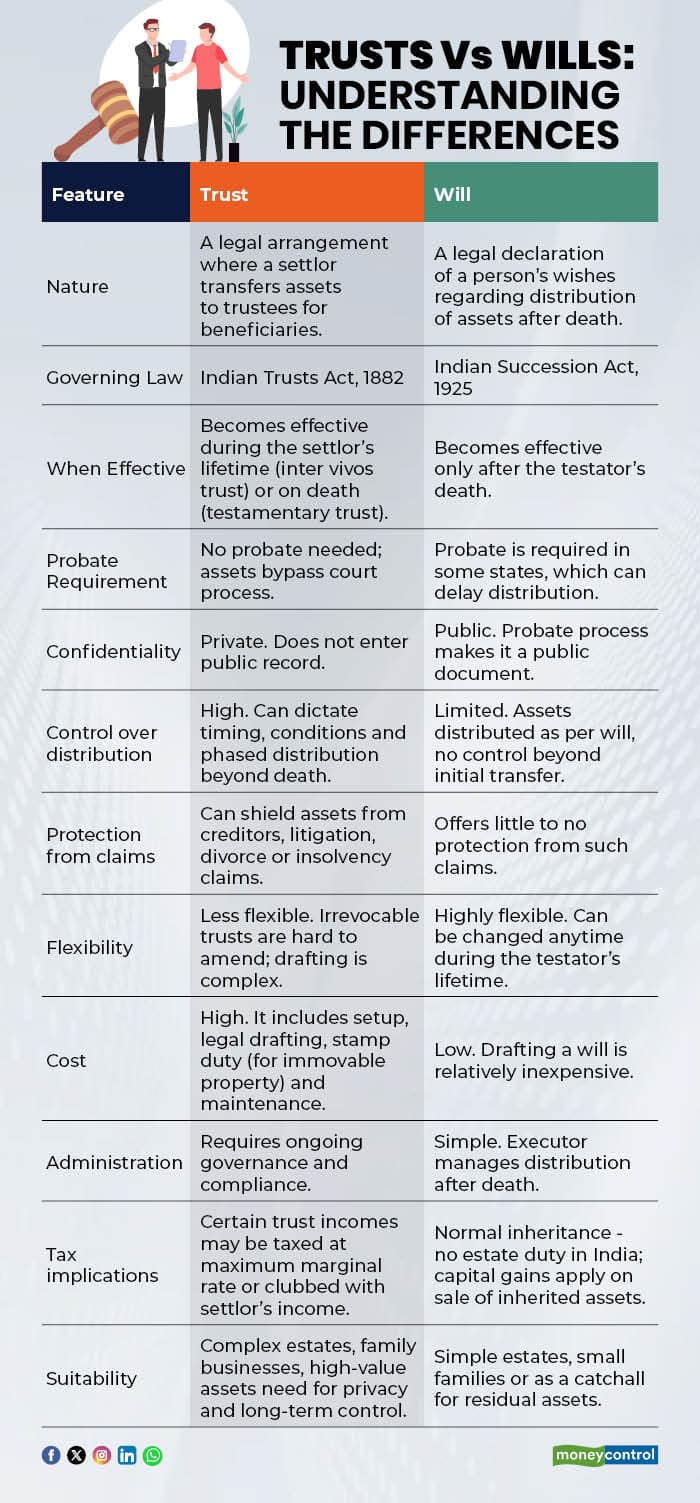



As India’s rich prepare for an intergenerational transfer of $44.8 trillion by 2047, many are realising that how they pass on wealth matters as much as what they leave behind, making the trust-versus-will decision a crucial one.
Without clear guidance — only 2–3 percent of Indians have a will — and in the absence of formal estate planning, they risk entangling heirs in prolonged disputes, which can drain wealth through legal friction.
In trusts we trustTrusts, once the domain of the ultra‑rich, are steadily becoming mainstream among high-net-worth individuals (HNIs). Their chief draw lies in discretion — assets placed in a trust bypass probate, never entering the public record and often settle more swiftly than those governed by wills.
In a legal system burdened by backlog — inheritance and property disputes account for roughly two‑thirds of civil cases — the ability of a trust to sidestep courts is increasingly valuable.
Moreover, trusts offer control that extends beyond death and embraces complex family structures. Irrevocable trusts, governed by the Indian Trusts Act of 1882, bring clarity to administration and taxation, helping affluent individuals orchestrate the fate of their estates across lifetimes and generations.
Discretionary or specific trusts further tailor distributions — whether timing inheritance for when children reach maturity, safeguarding business interests, or facilitating phased transfers — shielding wealth from creditors, litigation, or claims via divorce or insolvency. For family business owners, trusts can ring‑fence assets to uphold continuity even amid personal or financial upheaval.
Also read | Juggling US’ IRS and India’s I-T dept: How Indians investing in US stocks are taxed
In India, there are signs of growing trust adoption among business dynasties. Trust vehicles now hold an estimated 25 percent of the combined net worth of the country’s top 38 billionaires.
Simultaneously, some families have begun drafting formal “family constitutions” or charters, reinforcing governance, succession mechanisms, and cohesion across branches of complex family enterprises.

Yet, wills hold a vital place. Their appeal lies in simplicity, low cost and flexibility. A will can be swiftly drafted, does not require registration and remains easy to modify, making it the go‑to instrument for simpler estates.
Wills are irreplaceable when decisions about guardianship, funeral wishes, or distribution of assets not placed in a trust are involved.
Moreover, they serve as failsafe catchalls, ensuring that overlooked assets don’t fall through the cracks, especially when paired with trusts in a complementary fashion.
Also read | Here's how your Employee Provident Fund can beat equity
Trusts are not without downsides. They involve higher setup costs, including stamp duty on immovable property transfers, and require detailed legal drafting and ongoing administration.
Under tax law, income from certain trusts may be clubbed with the settlor’s income, limiting flexibility. Trusts also demand disciplined governance — vague terms, unclear succession protocols, or conflicting settlor instructions can spark family disputes — albeit usually resolved privately.
For India’s wealthy today, estate planning is transforming into a nuanced balance between control and simplicity.
Trusts offer structure, continuity, and confidentiality; wills provide ease, adaptability, and coverage where a trust may fall short.
Together, in a well‑integrated strategy, they empower individuals not only to protect their estates but to shape how their legacies shape India’s future.
The author is founder, managing director and SEBI-registered chief financial planner at Dilzer Consultants Pvt Ltd.Disclaimer: The views expressed by experts on Moneycontrol are their own and not those of the website or its management. Moneycontrol advises users to check with a financial advisor before taking any decisions.
Discover the latest Business News, Sensex, and Nifty updates. Obtain Personal Finance insights, tax queries, and expert opinions on Moneycontrol or download the Moneycontrol App to stay updated!
Find the best of Al News in one place, specially curated for you every weekend.
Stay on top of the latest tech trends and biggest startup news.